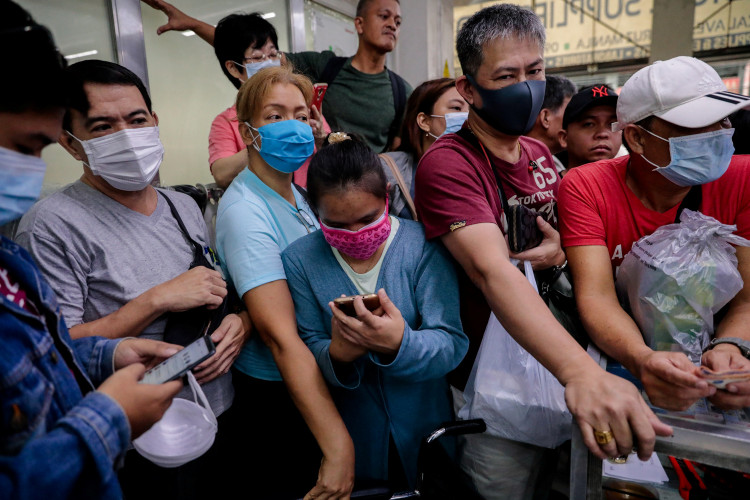China has just confirmed deaths of 425, adding up 64 new fatalities in Hubei on Tuesday. Across China, there are now 3,235 new confirmed infections, bringing the total to 10,438. Of those 632 recovered from infections.
As western countries, airlines and businesses were quick to decide on implementing travel bans, evacuations, and quarantines, some Asian nations were taking it one step a time. Most of them have only banned travels and required quarantines in the immediate knowledge of confirmed cases within their territories.
Japan now had 20 confirmed cases. Thailand had 19, Singapore 18, while the first death outside China was reported in the Philippines.
Hong Kong has just reported its first death on Tuesday. The 33-year-old man traveled from Hong Kong to Wuhan and then Changshanan in Hong Kong.
As the number of infections spiked, anti-China sentiment skyrocketed. There had been racism and xenophobia directed toward the Chinese. Establishments are barring Chinese customers; netizens are spreading malicious content about China's exotic meat trade on top of insults directed at Chinese people.
Amid all these, and with the highest infection rate in the Southeast Asian region, Thailand's borders remain open for travelers coming from Chinese cities. To date, there are still 180,000 Chinese tourists in Thailand. To be fair these tourists have been inside the country over the past two months.
Singapore, the third Asian country with the most confirmed deaths if Japan is included, said it remains confident that China can address the Wuhan coronavirus successfully. The country remains supportive of China's decision, officials said this week.
As of Monday Singapore had 262 suspected infections that were dismissed as negative while 32 remains pending. Still, for preventive measures, Singapore bans entry of all foreign nationals coming from China, regardless of nationality and what passport they carry. Local officials emphasized that travel bans are enforced based on geography.
Philippine President Rodrigo Duterte expressed similar logic, calling for Filipinos to stop with their anti-Chinese xenophobia. Filipinos are showing the strongest objections and criticisms against the Chinese people.
For instance, Adamson University subjected its Chinese students to a 14-day quarantine as a precaution while the correct handling should be asking all their foreign students who traveled from China to undergo such measures. The said university changed its directive after online backlash.
To be clear, the Philippines have already banned all travelers coming from China, regardless of nationality or passports their bear. Earlier, the country had only banned foreign nationals coming from Hubei, the epicenter of the outbreak.
China and the Philippines had an on-and-off relation, so to speak. For so long, the two countries have icy relations due to their conflicting territorial claims in the Southeast China Sea. Under Duterte, however, communications are more open with China investing more in the Philippines on top of loans it gave the country.
As all in the case of popular destinations around the world, Chinese tourists are also feeding the Philippines' tourism industry. Of the 7.5 million visitors to the Philippines this year, the Chinese accounted for 22%.
As of press time, three hundred Chinese passengers are stranded in Philippine airports because of canceled flights to and from China. The two governments are in contact with each other, making arrangements for their repatriation.
Indonesian health minister Terawan Agus Putranto called for its citizens to relax and do not panic. There had been no confirmed cases of coronavirus in the country. A majority of tourists feeding the Indonesian tourism industry are Chinese. At the same time that 10,000 Chinese tourists canceled their trips to Bali, the country is now banning all visitors who were in China for the last 14 days.
Cambodian Prime Minister Hun Sen, meanwhile, said he will not ban flights from China, nor will he be evacuating Cambodians from the country. He said citizens who benefit in China should now help fight the disease.
The prime minister discouraged wearing a mask as he himself doesn't wear one. He highlighted that no Cambodian, or foreigner in Cambodia died of coronavirus. With that said, he believed wearing a mask will only instigate unreasonable fears.
Myanmar, meanwhile, has preventive measures that strikes as bizare for the international observers. Buddhist monks are adding people to place seven grounds of peppercorns on the toungue to fight off the disease.
On the other hand, Asian countries such as Japan and Hong Kong were tougher in their measures. The country banned foreign nationals from China and prohibited, by principle, holders of Chinese passports from entry.
Hong Kong is shutting more mainland borders while medical staff conducts strikes, calling for the government to shut Hong Kong from the mainland.
To be clear, the World Health Organization discouraged countries from implementing travel bans, despite the organization designating it as a global emergency.
"WHO doesn't recommend and actually opposes any restrictions for travel and trade or other measures against China" said WHO chief Tedros Adhanom Ghebreyesus.
"If anyone is thinking about taking measures, it's going to be wrong," he said.






